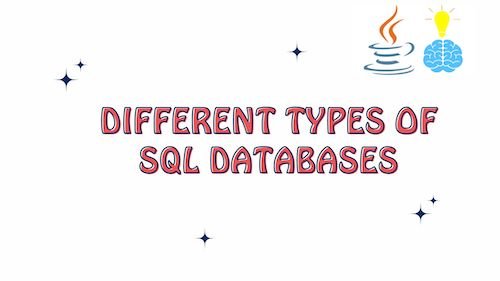In this article, we will learn about various types of SQL Databases. Let’s get started.

Various Types of SQL Databases
There are several types of SQL databases, each with its unique features and use cases. Here are some common types of SQL databases along with examples and what sets them apart from each other:
- MySQL:
- MySQL is an open-source relational database management system. It’s commonly used for web applications and content management systems.
- Differentiator: MySQL is known for its speed and reliability. It’s suitable for small to large-scale applications. One unique feature is its support for various storage engines, including InnoDB (for ACID transactions) and MyISAM (for full-text search).
- PostgreSQL:
- PostgreSQL, often referred to as “Postgres,” is an open-source relational database system. It’s known for its extensibility and support for complex queries.
- Differentiator: PostgreSQL excels in handling complex queries and supports advanced data types like JSON, arrays, and hstore. It has strong support for ACID compliance and offers features like table inheritance and custom functions.
- Microsoft SQL Server:
- Microsoft SQL Server is a relational database management system developed by Microsoft. It’s widely used in enterprise-level applications and supports integration with Microsoft products.
- Differentiator: SQL Server offers excellent integration with other Microsoft tools and services. It provides features like transparent data encryption, Always On availability groups for high availability, and SQL Server Reporting Services (SSRS) for reporting.
- Oracle Database:
- Oracle Database is a commercial relational database management system developed by Oracle Corporation. It’s popular in enterprise environments, particularly for large-scale applications.
- Differentiator: Oracle is known for its scalability, security, and advanced features like partitioning, advanced analytics, and data compression. It’s suitable for mission-critical applications and offers robust data management capabilities.
- SQLite:
- SQLite is a self-contained, serverless, and zero-configuration SQL database engine. It’s often embedded in mobile apps, desktop applications, and IoT devices.
- Differentiator: SQLite is lightweight and requires minimal setup. It’s a great choice for embedded systems and applications that need a local database without the need for a separate database server. It’s ACID-compliant and supports transactions.
- Amazon Aurora:
- Amazon Aurora is a cloud-native relational database service provided by Amazon Web Services (AWS). It’s compatible with MySQL and PostgreSQL.
- Differentiator: Aurora is designed for high performance and scalability in the cloud. It offers features like automatic failover, continuous backup to Amazon S3, and read replicas for scaling read workloads. It’s an excellent choice for cloud-based applications.
- MariaDB:
- MariaDB is an open-source relational database management system and MySQL fork. It’s designed to be a drop-in replacement for MySQL.
- Differentiator: MariaDB maintains compatibility with MySQL while adding its own features and enhancements. It offers the Aria storage engine and Galera Cluster for synchronous multi-master replication, making it suitable for high availability setups.
- IBM Db2:
- IBM Db2 is a family of data management products, including Db2 for Linux, UNIX, and Windows (LUW), as well as Db2 for z/OS for mainframes.
- Differentiator: Db2 is known for its performance and scalability. It supports multi-model data (relational, JSON, XML), advanced analytics with Db2 Warehouse, and Db2 on Cloud for cloud-based deployments.
Each type of SQL database has its strengths and weaknesses, making them suitable for different use cases. The choice of a database system depends on factors such as scalability requirements, data complexity, budget, and the specific needs of your application or organization.
Related Articles on SQL:
- Views in SQL : Comprehensive Guide
- Constraints in SQL
- Aggregate Functions in SQL
- Triggers in SQL
- 7 Types of Join in SQL
- Create Table in SQL
- Different Types of SQL Statements: A Comprehensive Guide
- Using Limit in SQL Queries
- Functions in SQL: Comprehensive Guide
- Exploring Coalesce Function in SQL with Examples
